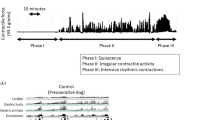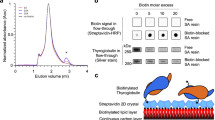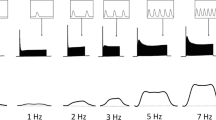Abstract
THE increased consumption of oxygen produced by thyroxine was investigated with white mice desensitized with histamine. We have published elsewhere an account of the mechanism of histamine desensitization (which is, in fact, a decreased sensitivity to histamine), and the test which was used for controlling the establishment of desensitization1,2,3. The oxygen consumption was recorded on an Issekutz apparatus4 at 30° C. The experiments were performed on forty white mice, with forty controls, between the weights of 19 and 22 gm.
This is a preview of subscription content, access via your institution
Access options
Subscribe to this journal
Receive 51 print issues and online access
$199.00 per year
only $3.90 per issue
Buy this article
- Purchase on Springer Link
- Instant access to full article PDF
Prices may be subject to local taxes which are calculated during checkout
Similar content being viewed by others
References
Fabinyi, M., and Szebehely, J., Arch. Int. Pharmacodyn., 75, 402 (1948).
Fabinyi, M., and Szebehely, J., Schweiz. Med. Wschr., 79, 299 (1949).
Fabinyi, M., and Szebehely, J., Acta Allerg., 2, 233 (1949).
Issekutz, B., Schmiedebergs Arch., 199, 306 (1942).
Author information
Authors and Affiliations
Rights and permissions
About this article
Cite this article
FABINYI-SZEBEHELY, M., GYERMEK, L. & SZEBEHELY, J. Effect of Histamine Desensitization upon Thyroxine Sensitivity. Nature 165, 155–156 (1950). https://doi.org/10.1038/165155b0
Issue Date:
DOI: https://doi.org/10.1038/165155b0
This article is cited by
-
Antihistamines and Thyroxine Metamorphosis in Tadpoles
Nature (1951)
-
Pharmakologie der Schilddr�sent�tigkeit
Naunyn-Schmiedebergs Archiv f�r Experimentelle Pathologie und Pharmakologie (1951)
Comments
By submitting a comment you agree to abide by our Terms and Community Guidelines. If you find something abusive or that does not comply with our terms or guidelines please flag it as inappropriate.



